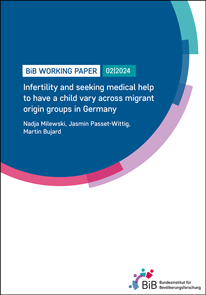Sonstige PublikationenInfertility and seeking medical help to have a child vary across migrant origin groups in Germany
Milewski, Nadja; Passet-Wittig, Jasmin, Bujard, Martin (2024)
BiB Working Paper 2/2024. Wiesbaden: Bundesinstitut für Bevölkerungsforschung
This study investigates the extent to which immigrants are faced with infertility and their utilization of reproductive health-care services in Germany. Previous research on migrant fertility centered mostly on the higher fertility rates of immigrants and their adaptation processes, but has largely neglected infertility. In contrast, research on infertility in the European low-fertility context focused almost exclusively on non-migrant populations. Our paper aims to serve as a bridge between these two crucial, yet distinct research areas of current demographic developments. We derived theoretical considerations from frameworks of fertility and health of migrants and minority groups. Using waves of German panel data (pairfam), we applied pooled panel regression analyses with self-perceived infertility and having used medical assisted reproduction services as dependent variables. Generally, the results indicate higher infertility and lower seeking of medical help among migrants as compared to non-migrants. However, there is substantial heterogeneity between different migrant groups: First-generation migrants show higher risks of infertility and lower usage of medical help to get pregnant. The study also indicates variation across (parents’) regions of origin: women and men from Russia, Central Asia, and the Middle East (including Turkey) have an increased risk of self-perceived infertility or uncertainty about it than other migrant origin groups. Those from Russia and Central Asia have the lowest usage of medical help-seeking. These results suggest that selected immigrant groups – despite their on average rather higher number of children – face remarkable reproductive disadvantages, which deserves further attention in research on migrant fertility and assisted reproduction in general.

